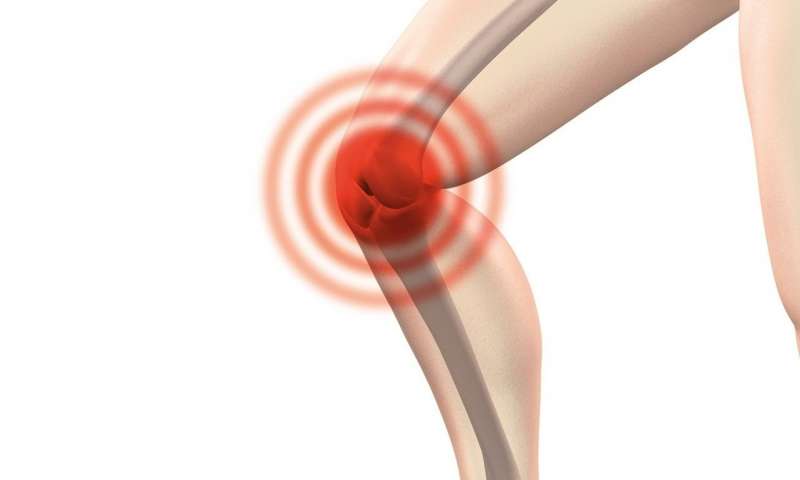Experimental growth factor shows promise for treating knee osteoarthritis











Experimental growth factor shows promise for treating knee osteoarthritis
More than 10 percent of Americans over age 60 experience knee pain related to osteoarthritis, the most common disease of the knee joint. Osteoarthritis of the knee causes pain, activity limitation, physical disability, reduced health-related quality of life and excess mortality compared with the general population. The pain is usually treated with over-the-counter pain relievers, anti-inflammatory drugs, local steroid injections and sometimes surgery. There are currently no drugs approved to treat the underlying cause of the condition, which results from the breakdown of joint cartilage covering the long bones due to increasing age, injury/overuse, obesity, genetics and/or local inflammation. A new experimental growth factor therapy, however, appears to prevent a worsening of osteoarthritis by increasing the thickness of cartilage in the knee joint and preventing further loss, according to results from an early clinical trial that were published today in the Journal of the American Medical Association.

Patients treated with the higher dose of sprifermin, however, did not experience any significant improvement in their arthritis symptoms—including pain, stiffness, and physical dysfunction like walking difficulties—compared to those given the lower dose or those given placebo injections.
"While the increase in cartilage thickness is a positive sign, we do not know at this point whether it has any clinical significance," said study lead investigator Marc Hochberg, MD, MPH a Professor of Medicine at UMSOM. "It is not known whether those who experience increased cartilage thickness over time will be able to avoid or delay knee replacement surgery."
While injections were stopped after 18 months, the analyses showed that the difference between groups that received the higher dose of sprifermin and placebo persisted out to three years. The study was designed to continue for a total of five years and future analyses of the entire trial dataset are planned.
In a more recent post-hoc analysis of the data, Dr. Hochberg and his colleagues evaluated a subgroup of osteoarthritis patients with severe pain and narrow joint space in their knee who were at higher risk of disease progression; they found that those in the group who received sprifermin 100μg every six months experienced significant improvements in their arthritis symptoms 18 months after their last injection compared to those who received placebo injections. "These results support further investigation of sprifermin as a potential osteoarthritis treatment for both structure modification and symptom relief for higher-risk patient populations," Dr. Hochberg said. These results were presented in June at the European Congress of Rheumatology's annual meeting,
"Finding an effective therapy that can treat the cause of common chronic pain conditions like osteoarthritis would be a ground-breaking achievement," said E. Albert Reece, MD, Ph.D., MBA, Executive Vice President for Medical Affairs, UM Baltimore, and the John Z. and Akiko K. Bowers Distinguished Professor and Dean, University of Maryland School of Medicine. "I'm proud that our scientists are helping to move the knowledge forward on the effectiveness of new therapies to replace worn cartilage in the joints. This is very important work, and more answers are certainly needed."
Side effects associated with the use of sprifermin were mostly mild or moderate and consisted mainly of acute inflammatory reactions (pain, redness, swelling) at the site of the injections. The study was funded by Merck KGaA, manufacturer of sprifermin, located in Darmstadt, Germany.
Reference by University of Maryland School of Medicine
No thoughts on “Experimental growth factor shows promise for treating knee osteoarthritis”
Articles - Most Read
- Home
- LIVER DIS-EASE AND GALL BLADDER DIS-EASE
- Contacts
- African Wholistics - Medicines, Machines and Ignorance
- African Wholistics -The Overlooked Revolution
- African Holistics - Seduced by Ignorance and Research
- The Children of the Sun-3
- Kidney Stones-African Holistic Health
- The Serpent and the RainBow-The Jaguar - 2
- PART ONE: DIS-EASE TREATMENT AND HEALTH-3
- 'Tortured' and shackled pupils freed from Nigerian Islamic school
- King Leopold's Ghost - Introduction
- PART ONE: DIS-EASE TREATMENT AND HEALTH-4
- PART ONE: DIS-EASE TREATMENT AND HEALTH-2
- PART ONE: DIS-EASE TREATMENT AND HEALTH-5
- African Wholistics - Medicine
- Menopause
- The Black Pharaohs Nubian Pharaohs of Ancient Egypt
- The Mystery System
- PART ONE: DIS-EASE TREATMENT AND HEALTH-6
Who's On Line?
We have 148 guests and no members online
Ad Agency Remote
Articles - Latest
- The Male G Spot Is Real—and It's the Secret to an Unbelievable Orgasm
- Herbs for Parasitic Infections
- Vaginal Care - From Pubes to Lubes: 8 Ways to Keep Your Vagina Happy
- 5 Negative Side Effects Of Anal Sex
- Your Herbs and Spices Might Contain Arsenic, Cadmium, and Lead
- Struggling COVID-19 Vaccines From AstraZeneca, BioNTech/Pfizer, Moderna Cut Incidence Of Arterial Thromboses That Cause Heart Attacks, Strokes, British Study Shows
- Cartilage comfort - Natural Solutions
- Stop Overthinking Now: 18 Ways to Control Your Mind Again
- Groundbreaking method profiles gene activity in the living brain
- Top 5 health benefits of quinoa
- Chromolaena odorata - Jackanna Bush
- Quickly Drain You Lymph System Using Theses Simple Techniques to Boost Immunity and Remove Toxins
- Doctors from Nigeria 'facing exploitation' in UK
- Amaranth, callaloo, bayam, chauli
- 9 Impressive Benefits of Horsetail
- Collagen The Age-Defying Secret Of The Stars + Popular Products in 2025
- Sarcopenia With Aging
- How to Travel as a Senior (20 Simple Tips)
- Everything you need to know about mangosteen

